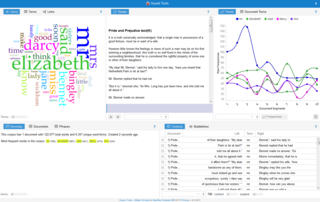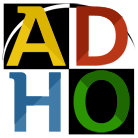A concordancer is a computer program that automatically constructs a concordance. The output of a concordancer may serve as input to a translation memory system for computer-assisted translation, or as an early step in machine translation.

Roberto Busa was an Italian Jesuit priest and one of the pioneers in the usage of computers for linguistic and literary analysis. He was the author of the Index Thomisticus, a complete lemmatization of the works of Saint Thomas Aquinas and of a few related authors.
Stylometry is the application of the study of linguistic style, usually to written language, but it has been applied successfully to music and to fine-art paintings as well. Another conceptualization defines it as the linguistic discipline that evaluates an author's style through the application of statistical analysis to a body of their work.

Digital humanities (DH) is an area of scholarly activity at the intersection of computing or digital technologies and the disciplines of the humanities. It includes the systematic use of digital resources in the humanities, as well as the analysis of their application. DH can be defined as new ways of doing scholarship that involve collaborative, transdisciplinary, and computationally engaged research, teaching, and publishing. It brings digital tools and methods to the study of the humanities with the recognition that the printed word is no longer the main medium for knowledge production and distribution.
Oxford Text Archive (OTA) is an archive of electronic texts and other literary and language resources which have been created, collected and distributed for the purpose of research into literary and linguistic topics at the University of Oxford, England.
Humanist is an international electronic seminar on humanities computing and the digital humanities, in the form of a long-running electronic mailing list and its associated archive. The primary aim of Humanist is to provide a forum for discussion of intellectual, scholarly, pedagogical, and social issues and for exchange of information among members.

The Digital Classicist is a community of those interested in the application of digital humanities to the field of classics and to ancient world studies more generally. The project claims the twin aims of bringing together scholars and students with an interest in computing and the ancient world, and disseminating advice and experience to the classics discipline at large. The Digital Classicist was founded in 2005 as a collaborative project based at King's College London and the University of Kentucky, with editors and advisors from the classics discipline at large.
Digital history is the use of digital media to further historical analysis, presentation, and research. It is a branch of the digital humanities and an extension of quantitative history, cliometrics, and computing. Digital history is commonly digital public history, concerned primarily with engaging online audiences with historical content, or, digital research methods, that further academic research. Digital history outputs include: digital archives, online presentations, data visualizations, interactive maps, time-lines, audio files, and virtual worlds to make history more accessible to the user. Recent digital history projects focus on creativity, collaboration, and technical innovation, text mining, corpus linguistics, network analysis, 3D modeling, and big data analysis. By utilizing these resources, the user can rapidly develop new analyses that can link to, extend, and bring to life existing histories
Professor Marilyn Deegan is the former Director of Research Development at the former Centre for Computing in the Humanities, now the Department of Digital Humanities), King's College London.

The Miguel de Cervantes Virtual Library is a large-scale digital library project, hosted and maintained by the University of Alicante in Alicante, Spain. It comprises the largest open-access repository of digitised Spanish-language historical texts and literature from the Ibero-American world. When officially launched in 1999, the BVMC was the first digital archive of Spanish-language texts on the internet, initially reproducing some 2,000 individual works by 400 of the most significant authors in Spanish, Latin American literary and Hispanic Africa. By 2005–2006 the number of registered and available works had reached over 22,000.

The Alliance of Digital Humanities Organizations (ADHO) is a digital humanities umbrella organization formed in 2005 to coordinate the activities of several regional DH organizations, referred to as constituent organizations. ADHO's constituent organizations are the European Association for Digital Humanities (EADH), the Association for Computers and the Humanities (ACH), the Canadian Society for Digital Humanities (CSDH/SCHN), centerNet, the Australasian Association for Digital Humanities (aaDH), the Japanese Association for Digital Humanities (JADH), Humanistica, the french-speaking association for Digital Humanities, and the Taiwanese Association for Digital Humanities (TADH), Digital Humanities Alliance for research and teaching innovations (DHARTI)from india etc.
Digital Humanities Quarterly is a peer-reviewed open-access academic journal covering all aspects of digital media in the humanities. The journal is also a community experiment in journal publication.

The European Association for Digital Humanities (EADH), formerly known as the Association for Literary and Linguistic Computing (ALLC), is a digital humanities organisation founded in London in 1973. Its purpose is to promote the advancement of education in the digital humanities through the development and use of computational methods in research and teaching in the Humanities and related disciplines, especially literary and linguistic computing. In 2005, the Association joined the Alliance of Digital Humanities Organizations (ADHO).
The Association for Computers and the Humanities (ACH) is the primary international professional society for digital humanities. ACH was founded in 1978. According to the official website, the organization "support[s] and disseminate[s] research and cultivate[s] a vibrant professional community through conferences, publications, and outreach activities." ACH is based in the United States, and has an international membership. ACH is a founding member of the Alliance of Digital Humanities Organizations (ADHO), a co-originator of the Text Encoding Initiative, and a co-sponsor of an annual conference.
Susan Hockey is an Emeritus Professor of Library and Information Studies at University College London. She has written about the history of digital humanities, the development of text analysis applications, electronic textual mark-up, teaching computing in the humanities, and the role of libraries in managing digital resources. In 2014, the University College of London created a Digital Humanities lecture series in her honour.
The Oxford Concordance Program (OCP) was first released in 1981 and was a result of a project started in 1978 by Oxford University Computing Services (OUCS) to create a machine independent text analysis program for producing word lists, indexes and concordances in a variety of languages and alphabets.
Lou Burnard is an internationally recognised expert in digital humanities, particularly in the area of text encoding and digital libraries. He was assistant director of Oxford University Computing Services (OUCS) from 2001 to September 2010 where he officially retired from OUCS. Prior to that, he was manager of the Humanities Computing Unit at OUCS for five years. He has worked in ICT support for research in the humanities since the 1990s. He was one of the founding editors of the Text Encoding Initiative (TEI) and continues to play an active part in its maintenance and development, as a consultant to the TEI Technical Council and as an elected TEI board member. He has played a key role in the establishment of many other key activities and initiatives in this area, such as the UK Arts and Humanities Data Service, and the British National Corpus and has published and lectured widely. Since 2008 he has also worked as a Member of the Conseil Scientifique for the CNRS-funded "Adonis" TGE.
Harold Short is Emeritus Professor of King's College London. He founded and directed the Centre for Computing in the Humanities until his retirement (2010). He was involved in the development with Willard McCarty of the world's first PhD programme in Digital Humanities (2005), and three MA programmes: Digital Humanities, Digital Culture and Society, and Digital Asset Management.
Roy Albert Wisbey was a British medievalist, Professor of German at King's College, London, and one of the leading figures in British German studies. He was also a pioneer in the field of digital humanities, founding the Literary and Linguistic Computing Centre in Cambridge in 1971 and later promoting the establishment of the Centre for Computing in the Humanities at King's. Over a period of 40 years he led the transformation of the Modern Humanities Research Association (MHRA) into a major scholarly publisher. He was recognized by both the German and Austrian governments for his contribution to German Studies.





